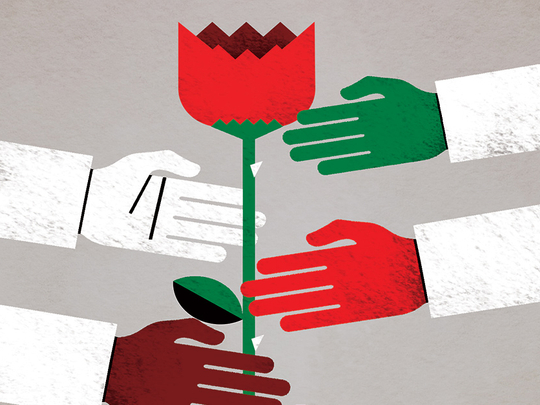
The coming GCC summit meeting in Doha, which is scheduled to start at the beginning of the second week of December, will be the most important and crucial one in years — if it goes ahead as planned.
It may make or break the entire alliance in the region. The challenge facing the regional entity is unprecedented and unusual. Three GCC countries — Saudi Arabia, UAE and Bahrain — suspended their diplomatic relations with Qatar in March this year, in protest of what they consider unacceptable polices being pursued by Doha — policies that the three GCC states believe are against their vital national interests and their allies in the region. Such a step hadn’t been imagined by even the most pessimistic observer of Gulf affairs.
Earlier this month, Shaikh Sabah Al Ahmad Al Sabah, the Emir of Kuwait, visited the UAE, Qatar and Bahrain, to pave the way for possible rapprochement. A week before that, he visited Saudi Arabia, for the same reason. Very little has come out of this shuttle diplomacy so far; it has not brought about any tangible results until now. There are leaks from unauthorised inside sources that a pre-summit meeting could be convened in Riyadh to find ways and means to reach some compromise.
Apart from the insistence of Kuwait to have all members present at the coming meeting in Doha, at least to keep up appearances, no party is interested in achieving that. Even the host country so far is not showing any signs of reaching an accord. The political and strategic costs of such a situation, if it continues, are immense.
Currently, the whole region is in turmoil. Syria and Iraq are in the midst of deep internal conflict. Yemen is not far from that either. The United States and the West in general are not interested in playing an active role to find ways and means to alter the prevailing situation; they have their own priorities. Egypt is not in a position to extend a hand. So the GCC states have been left on their own.
Playing into Iran’s hands
What kind of uncertainty would the Gulf face if this meeting is convened? First, the interests of Iran will indirectly be served, with the Iranians claiming victory in Yemen and threatening the border of both Oman and Saudi Arabia.
Iraq can represent Iranian interests and threaten the northern Gulf — Saudi Arabia and Kuwait. As the Iranians have the final say in Lebanon, they can choose a President with the help of Hezbollah, which is in any case running the country. The Gulf region will be open to an advance from Iran. The GCC people feel besieged on different fronts. That is why the Kuwaitis are doing their utmost not to let things get out of control.
A power vacuum could emerge in the region. But Kuwait will need a miracle to achieve its goal. The crises started with issues like Qatar’s very different attitude towards the Muslim Brotherhood. Qatar continued to oppose the new regime in Egypt with Al Jazeera’s programmes seen as negative propaganda against Qatar’s neighbours. Later, smaller issues emerged, like the naturalisation of certain individuals who are actually citizens of other Gulf states.
All in all, it looks like these issues, big or small, can be solved, if reasons prevail and the GCC can tolerate the differences. It should take into consideration two major points: One is the close historical relations between these countries and their populations and the second is the threat they would all face from outside and within if they continue with their bickering.
Gulf citizens are quite apprehensive about what they are witnessing — the widening of the gap between officials. The public believes this region has a lot in common, much more than the differences the officials are talking about. The times and circumstances do not allow for such differences to take centre-stage.
The challenges are not far; they are here. We witnessed the recent incident in the Eastern province of Saudi Arabia, and the disturbances in Bahrain have been going on for some time. These are examples of the challenges faced by the region.
Add to that the fact that the price of oil is going down sharply. Only God knows when it will pick up again.
The traditional allies of the GCC seem unwilling to help. The prospects for the future do not look bright.
All in all, for the GCC, this is the time to show unity and solidarity, not dissidence. It must remember the old saying: United we stand, divided we fall!
Mohammad AlRumaihi is a professor of political sociology at Kuwait University. You can follow him on Twitter at www.twitter.com/@rumaihi42










